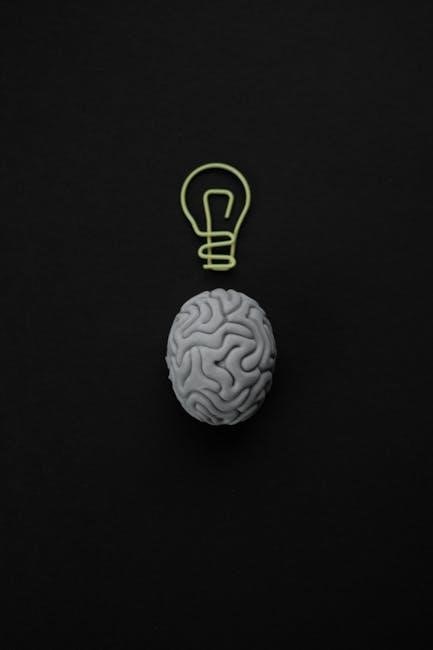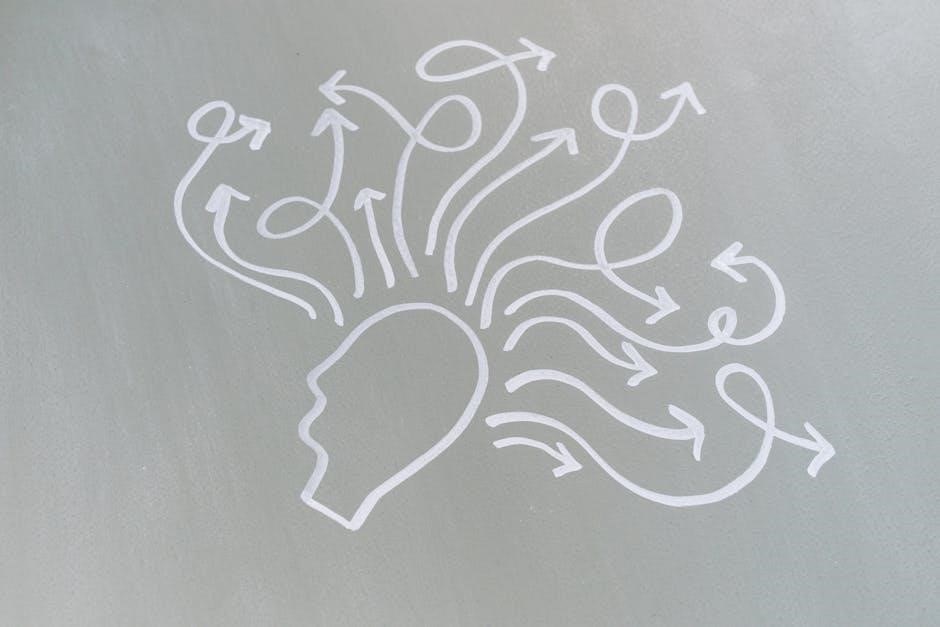Myers Psychology for the AP Course 3rd Edition: Overview
The 3rd edition, co-authored by David G․ Myers and C․ Nathan DeWall, offers an updated, comprehensive guide aligned with the AP Psychology curriculum framework․
It provides a balanced exploration of psychological principles, research methods, and contemporary applications, preparing students for the AP exam with clarity and depth․
Myers Psychology for the AP Course 3rd Edition is a comprehensive textbook designed to align with the AP Psychology curriculum framework․ It introduces foundational concepts, research methods, and contemporary applications in psychology, providing students with a clear and engaging understanding of the subject․ The text is structured to support deep learning and preparation for the AP exam, emphasizing critical thinking and practical insights․
Key Features of the 3rd Edition
The 3rd edition of Myers Psychology for the AP Course includes updated content, a new co-author, C․ Nathan DeWall, and enhanced digital resources․ It is aligned with the AP Psychology curriculum framework, offering interactive tools, practice questions, and real-world applications to deepen understanding․ The text also features streamlined chapters, making complex concepts accessible and engaging for students preparing for the exam․
History and Approaches in Psychology
Explores the historical development of psychology, tracing its evolution from early theories to modern approaches, providing a foundational understanding of the field’s growth and methodologies․
Historical Development of Psychology
The 3rd edition traces psychology’s evolution, from its philosophical roots to the emergence of structuralism, functionalism, and behaviorism․ It highlights key figures like Wundt and James, while also exploring the rise of cognitive psychology in the mid-20th century․ The text underscores how psychology transitioned from a speculative field to a scientific discipline, emphasizing evidence-based approaches and cultural influences shaping its growth․
Modern Approaches in Psychological Research
Modern psychological research integrates diverse approaches, including cognitive, behavioral, and neuroscience methodologies․ The 3rd edition emphasizes evidence-based practices, highlighting advancements in neuroimaging and data analysis․ It also explores contemporary themes like cross-cultural psychology and the role of technology in shaping research․ These approaches reflect psychology’s growing interdisciplinary nature, blending biological, social, and cognitive perspectives to understand human behavior comprehensively․

Research Methods in AP Psychology
The textbook covers scientific methods, research design, and data analysis, providing a solid foundation for understanding psychological research and its applications in studying behavior and mental processes․
Scientific Method and Research Design
The textbook emphasizes the scientific method, detailing steps like observation, hypothesis, experimentation, and conclusion․ It explores research design, including experimental and non-experimental methods, while addressing variables, validity, and ethical considerations․ Practical examples and clear explanations help students apply these concepts to psychological research, ensuring a strong foundation for understanding research principles and their real-world applications in psychology․
Statistics and Data Analysis in Psychology
The chapter covers essential statistical concepts, including descriptive statistics like mean and standard deviation, and inferential statistics such as t-tests and ANOVA․ It explains correlation and regression, emphasizing their role in psychological research․ The text also addresses the interpretation of data, graphical representations, and the importance of statistical significance in drawing valid conclusions, preparing students for data analysis in psychology․

Biological Psychology
Explores the biological basis of behavior, including brain structure, neurotransmitters, hormones, and genetics, providing a foundational understanding of the physical systems underlying psychological processes․
Structure and Function of the Brain
The brain’s structure includes the brainstem, cerebellum, and cerebrum, each responsible for controlling vital functions, coordinating movement, and managing higher cognitive processes․ The limbic system regulates emotions and memory, while the cerebral cortex handles sensory processing, motor control, and complex thinking․ Understanding these components is crucial for grasping biological psychology concepts․
Neurotransmitters and Hormones
Neurotransmitters like dopamine and serotonin facilitate neural communication, influencing mood and behavior․ Hormones, produced by endocrine glands, regulate bodily functions such as metabolism and growth․ The hypothalamus and pituitary gland play central roles in hormone regulation, affecting organs like the thyroid and adrenal glands․

Sensation and Perception
Sensation involves detecting stimuli, while perception interprets them, shaping our reality․ Key theories explain how we organize and make sense of sensory information․
Process of Sensory Information
The process begins with detection, as stimuli exceed absolute thresholds․ Perception organizes these inputs, creating meaningful experiences․ Absolute thresholds define the minimum detectable stimulus, while difference thresholds determine noticeable variations․ Weber’s Law explains the proportional relationship between these thresholds, highlighting how sensitivity varies across sensory modalities․ This foundation is crucial for understanding human perception and cognition․
Theories of Perception
Theories of perception explain how we organize and interpret sensory information․ Bottom-up processing starts with raw sensory data, building up to recognition․ Top-down processing uses prior knowledge and context to shape perceptions․ These theories highlight how perception is an active, constructive process influenced by both external stimuli and internal cognitive frameworks, like perceptual set and expectation․
Learning and Conditioning
Learning and conditioning are fundamental concepts studied through psychological principles and research methods, focusing on how behaviors and cognitive processes develop and change over time․
Classical Conditioning
Classical conditioning, discovered by Ivan Pavlov, explains how neutral stimuli can elicit natural responses when paired with unconditioned stimuli․ This learning process involves associations between stimuli and responses, such as ringing a bell before presenting food, leading to salivation․ Over time, the neutral stimulus alone triggers the conditioned response, demonstrating how environments shape behavior through predictable patterns and associations․
Operant Conditioning
Operant conditioning, developed by B․F․ Skinner, focuses on how behaviors are controlled by their consequences․ Positive reinforcement increases behavior frequency, while negative reinforcement removes unpleasant stimuli to encourage actions․ Punishment decreases undesired behaviors, and extinction occurs when reinforcement stops, leading to behavior reduction․ This fundamental concept explains how external factors shape voluntary actions, emphasizing the role of environment in learning and behavior modification․

Motivation and Emotion
Motivation drives behavior toward goals, while emotions are psychological and physiological states․ Theories like Maslow’s hierarchy and self-determination theory explain motivation, while emotions like happiness and fear impact well-being․
Theories of Motivation
Motivation theories explain what drives behavior․ Maslow’s hierarchy focuses on needs, from basic physiological to self-actualization․ Self-determination theory emphasizes autonomy, competence, and relatedness․ Drive-reduction theory suggests behavior aims to reduce physiological needs․ These theories provide frameworks for understanding why people act and pursue goals, highlighting the complexity of human motivation and its underlying psychological mechanisms․
Psychological Theories of Emotion
Emotion theories explain how we experience and interpret feelings․ James-Lange theory posits emotions result from physical responses․ Cannon-Bard suggests emotions occur when the thalamus triggers simultaneous physical and emotional responses․ Schachter’s two-factor theory combines arousal with cognitive appraisal․ These theories provide insights into the biological and cognitive processes underlying emotional experiences, shaping our understanding of human emotional responses and their complexity․
Developmental Psychology
Developmental psychology explores human growth across the lifespan, focusing on cognitive, social, and emotional development․ It examines how individuals change and adapt from infancy to adulthood․
Stages of Human Development
Human development encompasses physical, cognitive, and emotional growth across the lifespan․ Key stages include infancy, childhood, adolescence, adulthood, and aging․ Each stage brings unique developmental tasks and challenges․ Infancy focuses on trust and motor skills, while adolescence emphasizes identity formation․ Adulthood involves career and family responsibilities, and aging addresses reflection and life satisfaction․ These stages are shaped by biological, psychological, and social factors․
Cognitive Development Across the Lifespan
Cognitive development across the lifespan explores growth in thinking, memory, and problem-solving from infancy to old age․ It examines key theories, including Piaget’s cognitive stages and Erikson’s psychosocial development․ The text also covers information processing, neuroplasticity, and cognitive changes in aging, providing a comprehensive understanding of mental development․
Personality
Personality examines individual differences and traits, exploring theories and research methods to understand behavior, mental processes, and interactions across various contexts and developmental stages․
Psychoanalytic Theory
Psychoanalytic theory, developed by Sigmund Freud, emphasizes unconscious thoughts, desires, and childhood experiences in shaping behavior and personality․ It introduces concepts like the id, ego, and superego, and defense mechanisms such as repression․ The theory posits that unresolved conflicts and repressed memories influence psychological functioning and behavior, often manifesting in symbolic ways through dreams and slips of the tongue․
Trait and Humanistic Theories
Trait theories focus on personality dimensions, such as the Big Five model, emphasizing individual differences in stable characteristics․ Humanistic theories, like those of Carl Rogers and Abraham Maslow, highlight self-actualization, personal growth, and inherent human potential․ These approaches contrast with psychoanalytic views, offering a more optimistic perspective on personality development and human behavior․
Clinical Psychology
Clinical psychology focuses on diagnosing and treating psychological disorders․ The 3rd edition explores various therapies and modern treatment approaches, offering insights into effective interventions․
Psychological Disorders
The 3rd edition thoroughly covers psychological disorders, including anxiety, depression, and personality disorders․ It explores classifications, symptoms, and the impact of biological and environmental factors․ The text provides insights into the DSM-5 framework and contemporary understandings of mental health conditions, offering a clear foundation for AP students to grasp these complex topics effectively․
Therapies and Treatments
The 3rd edition discusses various therapies and treatments for psychological disorders, including cognitive-behavioral therapy (CBT), psychodynamic therapy, and humanistic approaches․ It also explores biological treatments like medication and electroconvulsive therapy․ The text emphasizes evidence-based practices and the importance of matching treatments to individual needs, providing students with a well-rounded understanding of therapeutic interventions in modern psychology․

Cognitive Psychology
Cognitive psychology explores mental processes like memory, thinking, and problem-solving․ The 3rd edition examines how these processes influence behavior and decision-making, offering insights into human cognition․
Memory and Forgetting
Memory involves encoding, storing, and retrieving information․ The Myers text discusses types of memory, such as sensory, short-term, and long-term, and factors influencing retention․ Forgetting occurs due to decay, interference, or inability to retrieve information․ Techniques like chunking and mnemonics can enhance memory, while cognitive biases may distort recall․
Problem-Solving and Decision-Making
Problem-solving involves identifying strategies to overcome challenges, while decision-making requires evaluating options to reach optimal choices․ The Myers text explores cognitive strategies, such as algorithms and heuristics, and biases like confirmation bias that influence decisions․ Techniques like divergent thinking enhance creativity, while metacognition improves self-awareness in problem-solving processes, aiding in more effective and rational outcomes․
Social Psychology
Social psychology explores how individuals think, feel, and behave in social contexts, examining group dynamics, attitudes, persuasion, and interpersonal relationships, as detailed in Myers’ comprehensive textbook․
Group Dynamics
Group dynamics, as explored in Myers’ textbook, examines how individuals behave in groups, including factors like cohesion, leadership, and decision-making processes․ Social loafing, where effort decreases in groups, is also discussed․ These concepts highlight how group interactions influence behavior and performance, offering insights into the complexities of social behavior and teamwork dynamics in various settings․
Attitudes and Persuasion
Myers’ 3rd edition explores attitudes as enduring evaluations influencing behavior and persuasion’s role in changing them․ The text discusses cognitive dissonance, the foot-in-the-door technique, and the importance of credibility in persuasive messages․ These concepts explain how attitudes form, persist, and change, emphasizing the interplay between beliefs, emotions, and social influence in shaping human behavior and decision-making processes effectively․
Psychological Disorders and Treatment
The 3rd edition covers psychological disorders, including anxiety, depression, and personality disorders, while exploring evidence-based treatments like psychotherapy and medication, emphasizing a biopsychosocial approach․
Classification and Diagnosis
The 3rd edition discusses psychological classification systems, including DSM-5 and ICD-11, emphasizing the importance of accurate diagnosis․ It highlights the criteria for identifying disorders, such as anxiety, depression, and personality disorders, while addressing challenges in classification and the role of cultural influences on diagnostic practices․ This section provides a clear framework for understanding psychological diagnosis in modern psychology․
Contemporary Treatment Approaches
The 3rd edition explores modern therapeutic methods, emphasizing evidence-based practices like cognitive-behavioral therapy (CBT), psychopharmacology, and mindfulness-based interventions․ It highlights the integration of psychotherapy with medication, as well as emerging trends in digital mental health tools․ These approaches aim to address diverse psychological needs, promoting recovery and well-being through personalized and effective treatment strategies․

